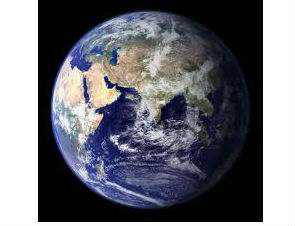Earth’s core is much hotter than thought

European scientists said Thursday that a new laboratory experiment shows the Earth’s core is likely much hotter than last reported 20 years ago. PHOTO FROM NASA.GOV
WASHINGTON—European scientists said Thursday that a new laboratory experiment shows the Earth’s core is likely much hotter than last reported 20 years ago.
It’s not that the iron core of our planet has warmed, but rather that the technique used to estimate its heat previously was flawed, researchers said in the journal Science.
Newer techniques have allowed experts at the European Synchrotron Radiation Facility to determine the temperature near Earth’s center to be 6,000 degrees Celsius (10,832 degrees Fahrenheit).
That is about 1,000 degrees C hotter than an experiment conducted by German researchers in 1993.
Researchers are analyzing the solid iron core of the Earth, where extreme temperatures and pressure result in a hard center, while the surrounding iron at lower temperatures of about 4,000 degrees Celsius remains liquid.
“We have developed a new technique where an intense beam of X-rays from the synchrotron can probe a sample and deduce whether it is solid, liquid or partially molten within as little as a second, using a process known diffraction,” said Mohamed Mezouar from the ESRF.
“And this is short enough to keep temperature and pressure constant, and at the same time avoid any chemical reactions.”
The X-ray technique is believed to be superior to the optical technique used by Germany’s Reinhard Boehler, who reported a result about 1,000 degrees cooler based on the observation of recrystallization which was interpreted as melting.
“These measurements confirm geophysical models that the temperature difference between the solid core and the mantle above, must be at least 1,500 degrees to explain why the Earth has a magnetic field,” the French team said of its findings.